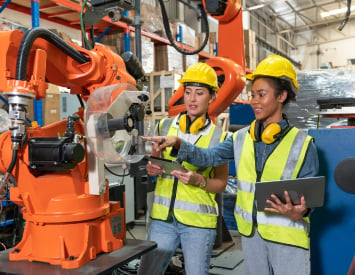From space safety to AI that creates images from text, plus the world’s biggest green hydrogen hub, we look at some of the best engineering innovations of the past year.

Since COVID-19 hit, most of us have been focusing on the adverse events of the two years that followed, so it is understandable that many of us have missed out on some of the fantastic engineering innovations that have taken place since the pandemic started.
Although it may not have seemed like it at the time — with social distancing, handwashing, and those suffocating face masks taking up all your attention — engineers have been hard at work changing our world as we know it.
While scientists and their fancy ideas often get most of the attention, engineers put those ideas into practice for real-world applications. So, as an homage to all engineers, including the Engineering Institute of Technology’s future innovators, here are some examples of how engineering has changed the way we do things in 2022 and beyond:
James Webb Telescope, DART, SKA, and Artemis II herald a new era of space exploration
In what promises to be a new age of the stars and space exploration, the James Webb Space Telescope lit up 2022 with breathtaking images of the early universe after the Big Bang. The telescope has heralded a new era of astronomy and untold revelations about the cosmos in years to come.
And while lost in space, some other “out there” achievements included: NASA’s Double Asteroid Redirection Test (DART) asteroid attack project, which may one day save Earth from collisions with world-ending space rocks, which took place in September 2022.
Also, since you may have missed the news because of the FIFA World Cup matches, one of the grand scientific projects of the 21st Century began its construction phase on Monday, 5 December.
Split across South Africa and Australia and with a headquarters in the UK; the Square Kilometre Array (SKA) will be the largest radio telescope in the world when completed in 2028. It will address the biggest questions in astrophysics while also searching for extra-terrestrials.
The last month of 2022 also brought the fabulous news of Artemis II mission success. In the next decade, we can see men (and women) stomping the moondust again.
Hydrogen Is Getting Real
For starters, global mining company Anglo-American launched its nuGen ZEHS hydrogen-powered mine haul truck prototype at its Mogalakwena mine in South Africa in May 2022. The truck is the world’s most extensive and operates in everyday mining conditions. Conceived as part of Anglo American’s FutureSmart Mining program, nuGen ZEHS is an end-to-end solution to decarbonize heavy-duty transport and includes hydrogen production, on-site storage, ultra-heavy duty refueling, and hydrogen-battery hybrid powertrains to replace incumbent fossil fuel technology.
Equally groundbreaking in this area is the Hydeal España by ArcelorMittal, Enagás, Grupo Fertiberia, and DH2 Energy: The largest green hydrogen hub. Although hydrogen is a valuable fuel source for decarbonizing industrial processes, obtaining it at scale involves using energy from natural gas to split water into hydrogen and oxygen with electrical currents. And for it to be sustainable, the entire process has to be powered with renewables. The project by the Spanish industrial consortium mentioned above aims to achieve this.
AI Takes to Games and Art

AI art platform DALL•E2 is flipping the art world by creating images from text descriptions in seconds. The trending text-to-art platform allows anyone to generate pictures with a keyboard instead of a brush. Is it a coincidence that the platform name sounds like Salvadore Dali? One thing is for sure, DALL•E2 is one for the art world’s history books.
And if that’s not enough, the past year also witnessed artificial intelligence created by Facebook’s parent company Meta become the first to achieve “human-level performance” in an online strategy game. The Diplomacy game emphasizes natural language negotiation and tactical coordination among players.
Later in December, news of another imperfect information game win came – in the game called Stratego, won by DeepMind’s model DeepNash. This certainly sets a new benchmark for AI.
Pilotless Planes and Helicopters
Over the next decade or two, aviation, as we know it, is about to undergo a mindblowing transformation as pilotless (also known as autonomous aircraft) will take over the skies. That’s exactly what a modified UH-60 helicopter is already doing. A product of a DARPA program called ALIAS (or Aircrew Labor In-Cockpit Automation System), the self-flying whirlybird made its first flights with zero occupants in February. In October, it retook flight, even carrying a 2,600-pound load beneath it.
Electric Vehicles Take to The Seas
The Candela P-12 Shuttle hydrofoil electric ferry will be the world’s fastest electric boat, with a speed of 30 knots. The boat rides on hydrofoils that lift it out of the water and consume less energy than typical boats. The City of Stockholm will take delivery of the first 30-passenger shuttle in 2023. The company is in talks with over 100 municipalities about water transportation solutions.
From space travel to flying cars, the latest mobile technology, and hydrogen innovation, engineers continue to lead the way in how our world adapts to current issues and moves into the future. And if the past year’s creations are anything to go by, we are ecstatic about what 2023 will bring!
References:
The most ingenious engineering feats of 2022
https://www.popsci.com/technology/best-engineering-innovations-2022/
Webb telescope promises a new age of the stars
https://phys.org/news/2022-12-webb-telescope-age-stars.html
SKA: Construction to begin on world’s biggest telescope
https://www.bbc.com/news/science-environment-63836496
HyDeal Picks Partners For PV-Hydrogen Project
https://www.bbc.com/news/science-environment-63836496
Anglo-American nuGen Hydrogen Project
https://southafrica.angloamerican.com/our-difference/futuresmart-mining/nugen
How to use DALL•E 2
Meta’s AI Gamer Beat Humans In Diplomacy
Mastering Stratego, the classic game of imperfect information
https://www.deepmind.com/blog/mastering-stratego-the-classic-game-of-imperfect-information
Candela’s P-12 flying electric ferry
https://electrek.co/2022/06/23/candela-p-12-shuttle-electric-boat-images/
Self-flying Helicopter




